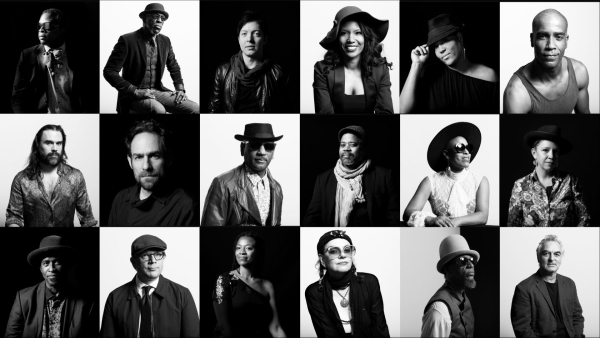The 12 Best Vegan Protein Sources
1. Quinoa
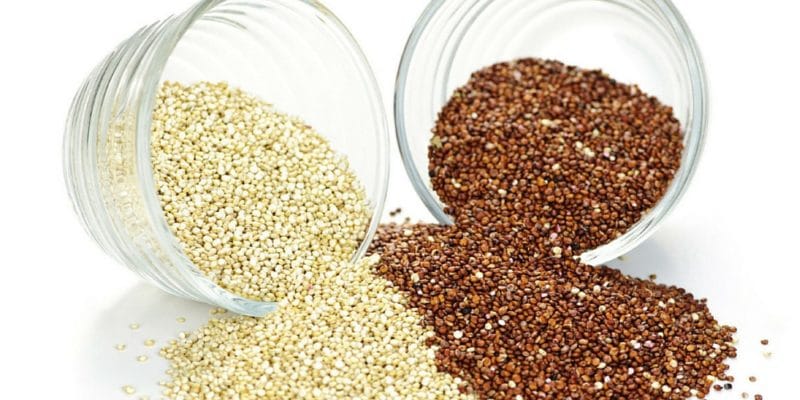
Quinoa is such an amazing food that scientists are trying to figure out how to cultivate it in space. Many people think it’s a grain, but it’s even better; it’s a seed that acts like a grain.
Scientists at the University of São Paulo in Brazil studied ten traditional Peruvian grains and legumes for their potential in managing the early stages of Type 2 diabetes. They found that quinoa was especially rich in an antioxidant called quercetin and that quinoa had the highest overall antioxidant activity (86%) of all ten foods studied. (Ranilla LG, Apostolidis E, Genovese MI, Lajolo FM, Shetty K. 2009)
The beauty of quinoa—aside from the fact that it’s a complete protein—is that it’s so versatile. It’s a great substitute for pasta or rice, but it’s also a great stand-in for oatmeal, granola and other foods that are generally sweetened. 1 cup of cooked quinoa has 8g of protein, which is plenty for one meal, and it’s also loaded with fiber, magnesium, potassium and several other goodies.
Cook it like oatmeal and have it with some almond milk and berries, throw it into some stir-fry, use it to make veggie soups heartier or even serve it with a red sauce like you would pasta.
Here are a few delicious quinoa recipes to try:
2. Lentils
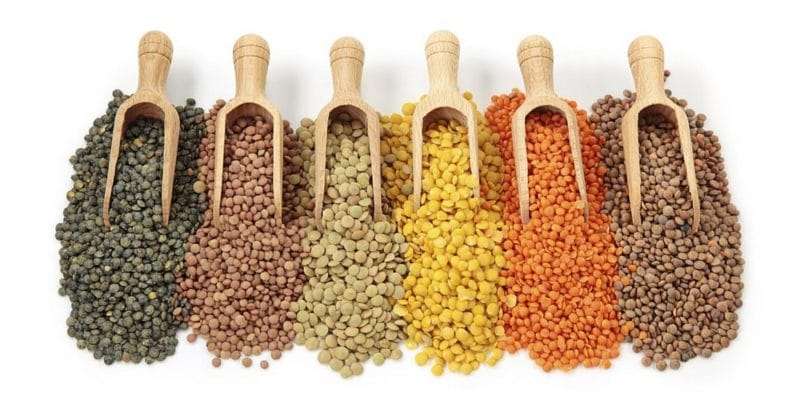
Lentils are a great source of protein, with 9g per cup of cooked lentils, 18g per cup of uncooked lentils
These little legumes are also significant sources of both folate and magnesium, high in fiber and are an excellent source of iron.
Lentils are also considered an excellent food for heart health. In addition to their fiber content, the magnesium that lentils contain has been shown to improve circulation, increasing the flow of nutrients and oxygen throughout the body.
In fact, a recent study done by researchers at Harvard University reported that increased magnesium may slash heart disease by as much as 30%.
Circulating magnesium was significantly associated with a lower risk of CVD, with trends toward a lower risk of IHD and fatal IHD. Dietary magnesium was associated with a significantly lower risk of IHD and showed a nonlinear association with fatal IHD. Our findings support the importance of dietary recommendations to increase magnesium-rich foods, including whole grains, nuts/seeds, and vegetables, which are also good sources of other nutrients. (Liana C Del Gobbo, Fumiaki Imamura, Jason HY Wu, Marcia C de Oliveira Otto, Stephanie E Chiuve, Dariush Mozaffarian 2013)
Lentils are a really versatile cooking ingredient and there are plenty of amazing recipes available online.
Check out some of my favorite ways to prepare them:
3. Black Beans
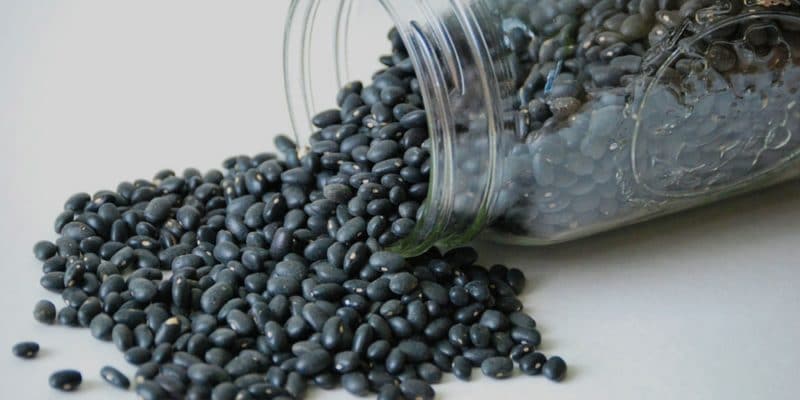
Black beans deserve their popularity as one of the go-to vegan protein sources for more reasons than they get credit for.
They’re an excellent source of plant-based protein, at 15g per cooked cup. They also contain 15g of total fiber, are an excellent source of ALA Omega-3 fatty acids, copper, Vitamin B-1, manganese, iron, phosphorous and magnesium.
There are numerous studies reporting the many health benefits of black beans.
One 2009 study found that black bean consumption may decrease the risk of colon cancer (Bennink 2009), a 2011 study found that black beans helped improve insulin resistance (Tetsuya Inagum1, Junkyu Han, Hiroko Isoda 2011) and yet another study found that eating black beans helped to reduce blood sugar in Type 2 diabetics. (Sharon V Thompson,Donna M Winham, Andrea M Hutchins 2012)
Black beans aren’t just great for soups and Latin dishes; try them a variety of ways.
Here are some good recipes to get you started:
4. Chickpeas (Garbanzo beans)
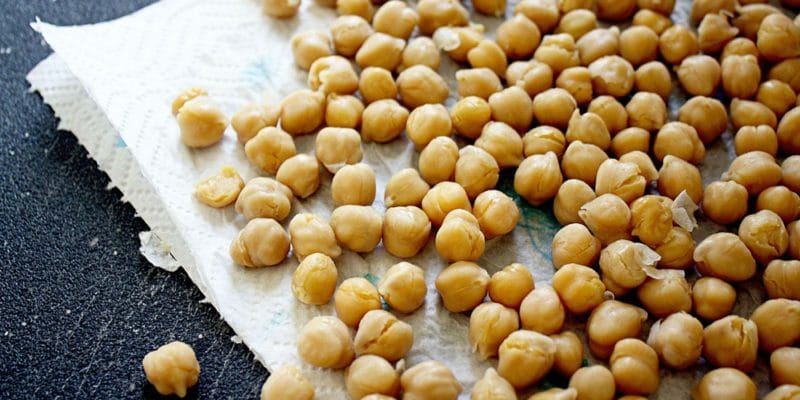
The mighty chickpea is one of the very best sources of protein for vegans , at a whopping 15g per cooked cup. It can be pretty difficult to eat an entire cup of garbanzo beans, but one way to get them into your diet is to add mashed garbanzo beans to brownies and other moist cookies and cakes.
There have been numerous recent studies on the value of garbanzo beans to heart health, colon health, the regulation of blood sugar and even the prevention of cancer.
One study showed that the high levels of folate in garbanzo beans is valuable because of the role folate plays in DNA repair and synthesis. Folate helps prevent the formation of cancer cells due to DNA mutation. (Ulrich 2007)
In a 12-week study on the role of garbanzo beans in reducing blood cholesterol, healthy adults consumed 728g of chickpeas or garbanzo beans per week and showed a significant drop in both LDL cholesterol and blood insulin levels. (P B Geila & J W Andersona 1994)
In addition to making hummus or adding chickpeas or garbanzo beans to baked goods, you can also try these recipes:
5. Chia
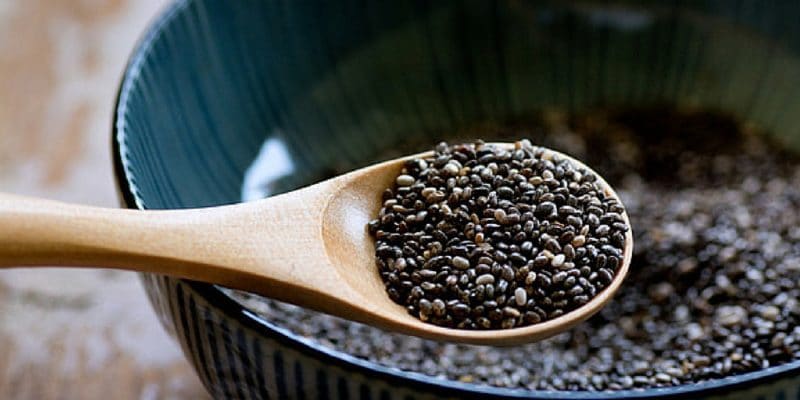
Just two teaspoons of chia seeds contain 4g of protein. That might not sound like much, but when you consider the versatility of chia, you can get quite a lot of additional protein throughout the day. Just add the seeds to greens drinks, hot cereals and protein shakes.
Chia is also a great source of both fiber and healthy fats. It is one of those ultimate superfoods you really should be eating more of.
In a 2005 study published in the journal Nutrition Research, researchers found that chia seeds are the single best plant-based source of ALA, or alpha-linoleic acid. (Ricardo Ayerza, Wayne Coates 2005).
ALA is known to help prevent cancer, decrease the risk of heart disease and even reduce cortisol levels.
[Related: 3 Ways Stress Causes Weight Gain]
One of the many cool things about chia is that it works great as a thickening agent, so you can use it as a substitute for eggs in your baking. That alone is huge for many vegetarians and vegans. But chia is also loaded with iron, something many vegans do have trouble getting in sufficient quantities.
Try some of these great recipes using chia and you’ll have no problem getting a good quantity of protein into your diet:
6. Hemp Seeds
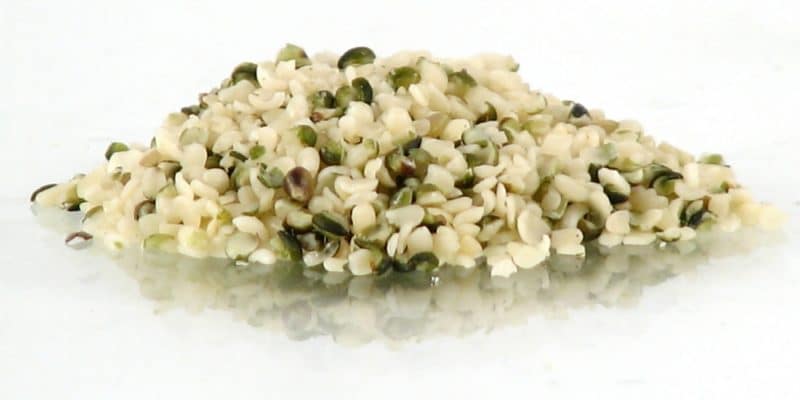
Hemp seed contains a whopping 10g of complete protein in just two tablespoons, making it the plant-based winner as far as the sheer amount of the nine essential amino acids.
One of the other really great things about hemp seed is that it’s one of the few vegan protein sources that’s packed with Omega-3 fatty acids.
You can add hemp seeds to protein shakes, smoothies and greens drinks, but they’re also great in baked goods like homemade trail mix, snack bars, muffins, cookies and cakes. You can get a great portion of protein from a handful of cookies – how happy does that make you?
Try these recipes:
7. Almonds
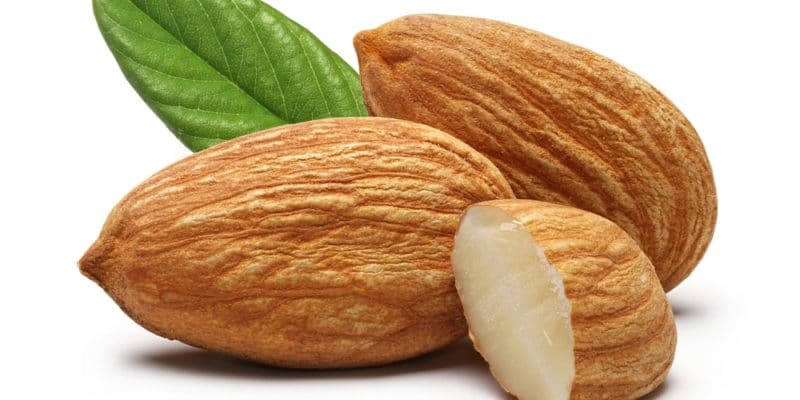
Almonds have always been considered an excellent source of healthy fats, such as Omega-3 fatty acids, but they’re also one of the most snackable vegan protein sources, with 30g of protein per cup. Of all of the tree nuts, almonds are the highest in protein, fiber, Vitamin E, calcium, niacin and riboflavin.
Almonds are also extremely easy to find in the store, very handy to keep with you throughout the day for a healthy snack and very versatile. Almond flour is a favorite among people who are living gluten-free.
While almonds are great just as they are, it’s convenient to use them in cooking, in order to get that daily protein in and enjoy them in new ways.
Here are some good recipes to try:
8. Pumpkin Seeds
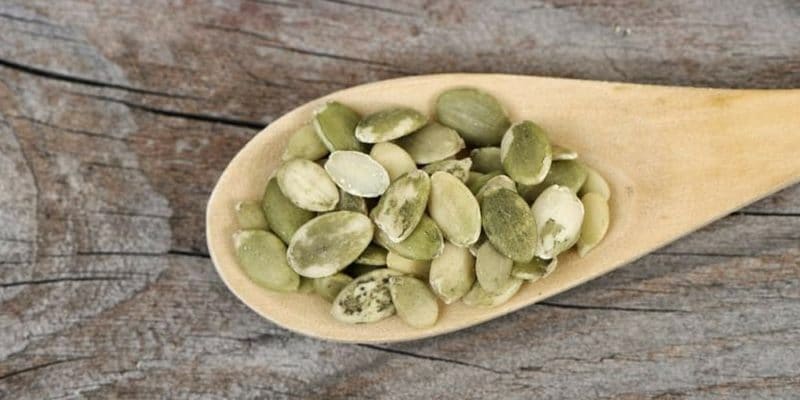
Pumpkin seeds are another favorite snack for healthy eaters, due to their healthy fat and high fiber content. But you shouldn’t overlook them as a protein source.
These tiny, tasty seeds contain 12g of protein per cup and it’s pretty easy to get an ounce of them just by snacking out of hand. But they’re also wonderful in homemade trail mix, cookies, bars, muffins and other baked goods.
Pumpkin seeds are also one of the best sources of zinc, with about 7mg of zinc in an ounce of roasted, shelled seeds. But one of the really exciting things about pumpkin seeds is that they may provide a wider array of types of Vitamin E than almost any other food.
The best way to benefit from a specific nutrient is to get it in as many forms as possible, and according to The World’s Healthiest Foods, recent research shows that pumpkin seeds contain “alpha-tocopherol, gamma-tocopherol, delta-tocopherol, alpha-tocomonoenol, and gamma-tocomonoenol. These last two forms have only recently been discovered in pumpkin seeds, and their health benefits—including antioxidant benefits—are a topic of current interest in vitamin E research, since their bioavailability might be greater than some of the other vitamin E forms.”
Pumpkin seeds are great roasted and eaten as is or added to salads and shakes, but here are some more ways to enjoy this nutrient-dense seed:
9. Sesame, Sunflower and Poppy Seeds
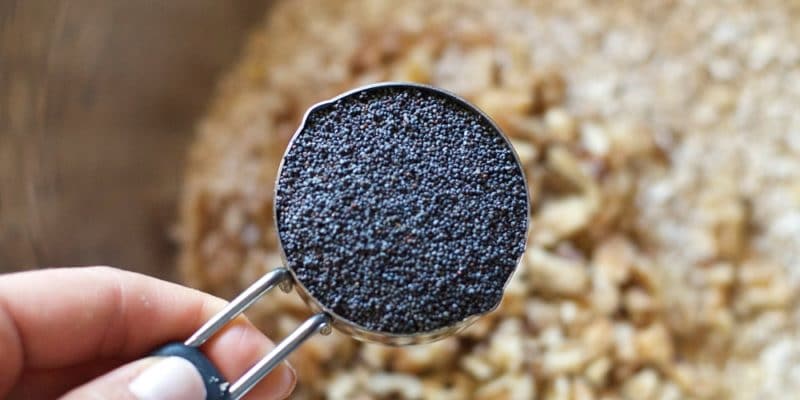
Sesame, poppy and sunflower seeds share similar nutrients and benefits, but they are all also a good source of plant-based protein. Each of them delivers about 1.5-1.6g of protein per tablespoon.
That might not sound like a lot of protein, especially if you’re looking for substantial vegan protein sources, but it’s effortless to get a few tablespoons into a salad, smoothie, sandwich, muffins and other baked goods.
Aside from protein and healthy fats, these seeds provide an excellent dose of several key minerals, especially calcium, iron and zinc.
These seeds are so easy to incorporate into your diet.
Here are a few recipes to try:
10. Wild or Brown Rice
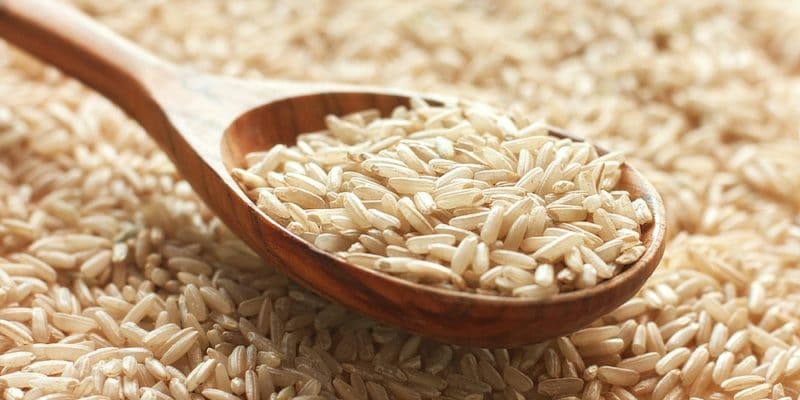
Brown rice is considered a vegan and vegetarian staple, mainly because it’s filling, inexpensive, delicious and packed with fiber. But brown rice also contains a good dose of protein, at 5g per cooked cup.
Brown rice is also one of the better sources of fiber for reducing blood glucose and blood insulin levels. In a recent study at Harvard University School of public Health, researchers found that by eating 50g of brown rice a day, people can reduce their risk of developing Type 2 diabetes by 16 percent.
Brown rice is also an excellent source of two very important antioxidants, selenium and manganese, which, among other things, prevent free radical damage, attack cancer cells and repair DNA. It’s one of those vegan protein sources that can easily become a staple in your diet.
Need some inspiration? Try these brown rice recipes:
11. Leafy Greens
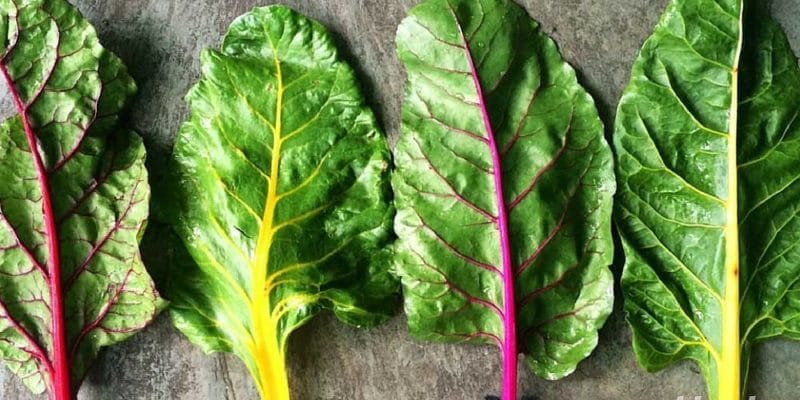
Most people don’t think of leafy greens as vegan protein sources, but they do contain protein.
You just need to eat a ton of them to get a decent amount. This is why herbivores such as giraffes and koalas spend their entire days eating.
However, leafy greens such as kale, spinach, endive, romaine, collards, turnip greens and mustard greens (just to name a few) are so dense in other nutrients that they should be a focal point of your diet.
Kale has about 1.5g of protein per chopped cup (raw), which isn’t a lot, but you can have it raw in salads, toss it into smoothies and greens drinks, add it to soups or sauté it as a side dish.
Spinach rarely gets the credit it deserves as one of the best vegan protein sources, but one cup of cooked spinach contains 6g of protein, which is terrific. Of course, one cup cooked is going to be at least one good sized bunch of raw or almost a full package of frozen.
Add it fresh to greens drinks and smoothies, use it instead of lettuce in your salad or sauté it with some garlic, onions and a squeeze of lemon and you’ll get a healthy dose of protein along with the iron and vitamin content that it’s better known for.
For most people, smoothies, juicing and greens drinks will be the easiest way to get the most protein from leafy greens, since you can fit quite a lot of greens into a glass, far more than most people will eat at one sitting.
Here are some recipes to get you started:
12. Spirulina
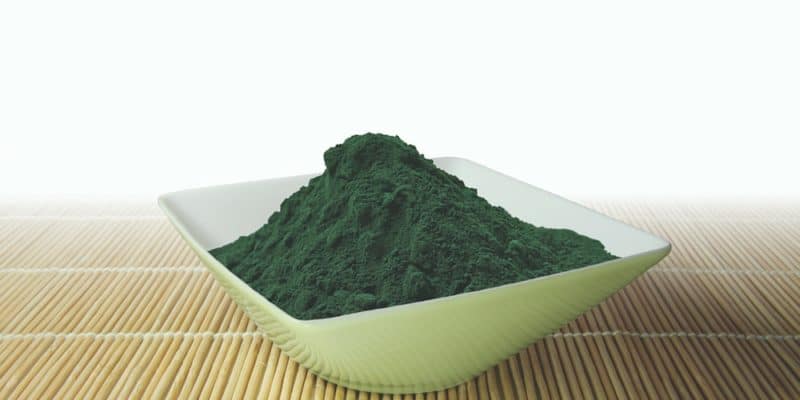
Spirulina has the highest concentration of protein out of all foods. A form of algae, spirulina is about 60% protein. In fact, most people could get their entire daily protein intake from one cup of spirulina (about 60g), but that’s a really tall order.
The best way to get a decent quantity of spirulina into your daily meal plan is through smoothies, greens drinks, and a superfood greens powder drink mix. Again, as with leafy greens, you can get an awful lot of spirulina into a glass. Of course, you don’t want to take it straight. Adding berries, bananas, apples, carrots and other sweeter vegetables will make spirulina far tastier than it is on its own or with other greens.
Here are a couple you should try:
See the Actual Serving Amounts You Need to Eat
Live from my own kitchen, I walk you through the real-life serving sizes of each of these power proteins.
The Two WORST Vegan Proteins
Based on everything I know, I feel obligated to warn you about two plant-based proteins that have become staples in the vegan/vegetarian kitchen, but shouldn’t be there at all.
1. Soy
I hope this isn’t too much of a shocker. Although soy is the probably the main ingredient in most vegan meat replacement foods out there—it might be the most popular vegan source of protein in the world—it’s also one of the worst.
First of all, when you see soy products, they’re almost always processed which is a huge, huge red flag. Processed foods are garbage, whether they’re vegetarian, vegan or not. This includes tofu, tempeh and soy-based snacks and meals.
There is no reason for you to compromise your health by eating junk that has been processed in a chemical plant and packaged into blocks. Foods aren’t healthy just because they don’t contain animal ingredients. Your diet needs to be based on whole foods.
That said, even in whole food form—such as edamame—soy is not the health jackpot that people make it out to be.
Soy is one of the most heavily sprayed crops in the world and is loaded with pesticides and herbicides, not only on its surface, but in its DNA. Genetically-modified soy varieties have been bred with herbicides and pesticides in them to make them almost maintenance free.
There are a number of other things that make soy a dangerous food.
Numerous studies have shown that soy, as a phytoestrogen (mimics estrogen and binds to estrogen receptors, blocking actual estrogen from doing the same), interferes with menstruation and may disrupt the endocrine system, much in the same way some breast cancer medications do.
In one study from 2001, it was found that a higher intake of spy led to longer periods for the women who participated, by as much as three days (Jakes RW, Alexander L, Duffy SW, Leong J, Chen LH, Lee WH 2001). In another study, it was found that soy isoflavones given to a control group resulted in interrupted or absent periods.
Six premenopausal women with normal, healthy menstrual cycles were given 45mg of soy isoflavones daily. This is about what you would find in 1-2 cups of soy milk or ½ cup of soy flour. After just thirty days in the study, all of the women experienced delayed cycles.
2. Seitan
Seitan isn’t one of the most popular vegan protein sources, but it is gaining in popularity and that’s upsetting.
There’s a reason why I say this. Seitan is made entirely of wheat gluten, which isn’t good for anyone, even if you don’t have a gluten sensitivity. Many researchers feel that consuming such a high concentration (there’s usually only a small amount of gluten in a wheat-based food) could lead to widespread inflammation by oversaturating the body with gluten.
While seitan is a good source of quantity protein, it just doesn’t make sense to turn to seitan when there are so many healthier options.
Now that you know how much protein you need, what is and isn’t true about plant-based protein and which vegan proteins are best for you, you can easily make sure that your vegan diet includes plenty of delicious, nutrient dense protein and that you enjoy a varied and interesting diet.




























 Schomburg Center for Research in Black Culture. Photo: Kate Glicksberg
Schomburg Center for Research in Black Culture. Photo: Kate Glicksberg
 Willem Dafoe in Mississippi Burning (c) 1988 Orion Pictures
Willem Dafoe in Mississippi Burning (c) 1988 Orion Pictures

